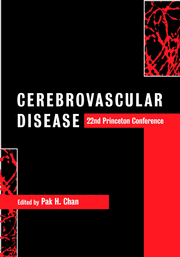Book contents
- Frontmatter
- Contents
- List of contributors
- Preface
- Acknowledgments
- Part I Special lectures
- Part II Oxidative stress
- Part III Apoptosis
- Part IV Hot topics
- Part V Hemorrhage, edema and secondary injury
- Part VI Inflammation
- Part VII Gene transfer and therapy
- Part VIII Neurogenesis and plasticity
- Part IX Magnetic resonance imaging in clinical stroke
- Part X Risk factors, clinical trials and new therapeutic horizons
- 32 Vascular factors in Alzheimer's disease
- 33 Beyond neuroprotection: the protection of axons and oligodendrocytes in cerebral ischemia
- 34 Combining neuroprotection with thrombolysis: how to translate laboratory success to our clinical trials
- 35 Prospects for improved neuroprotection trials in stroke
- 36 Basic research and stroke therapeutics: what have we learned?
- Index
- Plate section
32 - Vascular factors in Alzheimer's disease
from Part X - Risk factors, clinical trials and new therapeutic horizons
Published online by Cambridge University Press: 02 November 2009
- Frontmatter
- Contents
- List of contributors
- Preface
- Acknowledgments
- Part I Special lectures
- Part II Oxidative stress
- Part III Apoptosis
- Part IV Hot topics
- Part V Hemorrhage, edema and secondary injury
- Part VI Inflammation
- Part VII Gene transfer and therapy
- Part VIII Neurogenesis and plasticity
- Part IX Magnetic resonance imaging in clinical stroke
- Part X Risk factors, clinical trials and new therapeutic horizons
- 32 Vascular factors in Alzheimer's disease
- 33 Beyond neuroprotection: the protection of axons and oligodendrocytes in cerebral ischemia
- 34 Combining neuroprotection with thrombolysis: how to translate laboratory success to our clinical trials
- 35 Prospects for improved neuroprotection trials in stroke
- 36 Basic research and stroke therapeutics: what have we learned?
- Index
- Plate section
Summary
Introduction
The presence of cerebrovascular disease and vascular risk factors are generally considered to be exclusion criteria for the clinical diagnosis of Alzheimer's disease (AD). The high prevalence of cerebrovascular disease and AD in the elderly population means that the category of patients with dementia, stroke and vascular dementia, includes patients with AD. The criteria used to diagnose AD were established by consensus, with vascular abnormalities becoming an artificial border between vascular dementia and AD. However, growing evidence suggests that the distinction is not clear cut. Half of all patients with vascular disease who become demented also have AD and a third of patients with pathologically confirmed AD have evidence of vascular lesions. Brain infarcts may play an important role in determining the presence and severity of clinical symptoms of AD. Data from large population studies give validity to the construct of mixed AD/vascular dementia. It is not known whether the cerebral vascular pathology found in the brains of patients with AD is coincident or causal. Is there a direct interaction between the two pathological processes? Alternatively, does cerebrovascular disease unmask subclinical AD? Data supporting both arguments exist. The puzzle remains. Understanding the interaction between cerebrovascular and neurodegenerative disorders demands a radical shift in framework and thought process.
Coexistence of AD and vascular pathology
Several longitudinal studies have demonstrated that the changes of cerebrovascular disease and neurodegeneration with Alzheimer-type pathology have synergistic effects on cognition.
- Type
- Chapter
- Information
- Cerebrovascular Disease22nd Princeton Conference, pp. 393 - 403Publisher: Cambridge University PressPrint publication year: 2002



